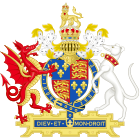Act for the Advancement of True Religion facts for kids
| Act of Parliament | |

|
|
| Citation | 34 & 35 Hen. 8. c. 1 |
|---|---|
Quick facts for kids Dates |
|
| Royal assent | 12 May 1543 |
| Other legislation | |
| Repealed by | Treason Act 1547 |
|
Status: Repealed
|
|
The Act for the Advancement of True Religion was an important law passed by the Parliament of England on May 12, 1543. This law aimed to control who could read the Bible and what kinds of stories and plays were allowed in England. It was a way for the King to make sure people followed his ideas about religion.
Contents
Understanding the Act for True Religion
This law, also known as the Act of 1543, was created during the reign of King Henry VIII. It was a time when there were many changes happening in religion across Europe. The King wanted to make sure that religious teachings in England matched his views.
Who Could Read the Bible?
One of the main parts of this Act was about reading the Bible. Before this law, more people were starting to read the Bible for themselves. However, the Act of 1543 changed that.
- Only certain groups were allowed to read the Bible. These included church leaders (clerics), noblemen, wealthy landowners (the gentry), and rich merchants.
- Women from noble families and the gentry could read the Bible, but only in private.
- Most other people were not allowed to read it. This included women who were not from noble or gentry families, servants, apprentices, and generally poor people. This meant many ordinary people could not read the Bible for themselves.
Plays and Performances
The Act also had rules about plays and performances.
- Plays that taught good morals were allowed. These plays had to show what was right (virtue) and what was wrong (vice).
- However, these plays were not allowed to go against the King's interpretation of the Bible. They had to support his religious views. This meant that plays could not challenge the official religious ideas of the time.
Books and What Was Allowed
The law also talked about different kinds of books and writings.
- The Act said that some people were trying to trick others with "printed ballads, rhymes, etc." These were seen as spreading false ideas, especially to young people.
- To stop this, the King wanted to remove "pestiferous and noisome" (harmful and annoying) books, ballads, rhymes, and songs.
- However, not all books were banned. The Act specifically allowed certain older books printed before 1540. These included:
- Books of laws (Statutes)
- History books (Chronicles)
- Famous stories like The Canterbury Tales by Geoffrey Chaucer
- Books by John Gower
- Stories about people's lives
The Act's End
The Act for the Advancement of True Religion did not last forever.
- It was later cancelled (repealed) by King Henry VIII's son, Edward VI.
- This happened in 1547, just a few years after it was first passed. The repeal was part of the Treason Act 1547. This shows that religious laws and ideas could change quickly during this period in English history.
 | Emma Amos |
 | Edward Mitchell Bannister |
 | Larry D. Alexander |
 | Ernie Barnes |

